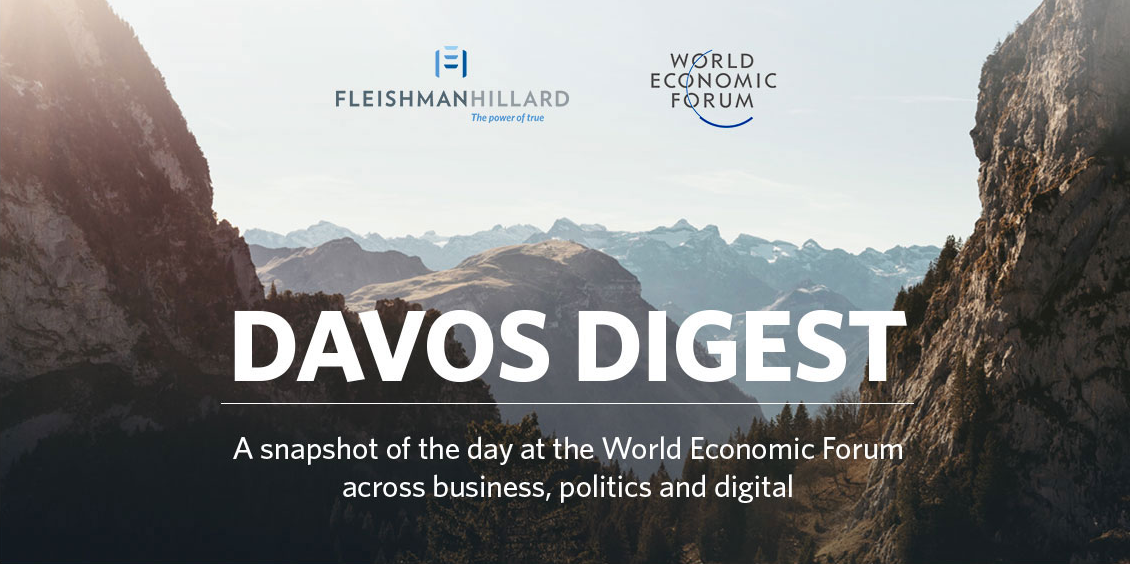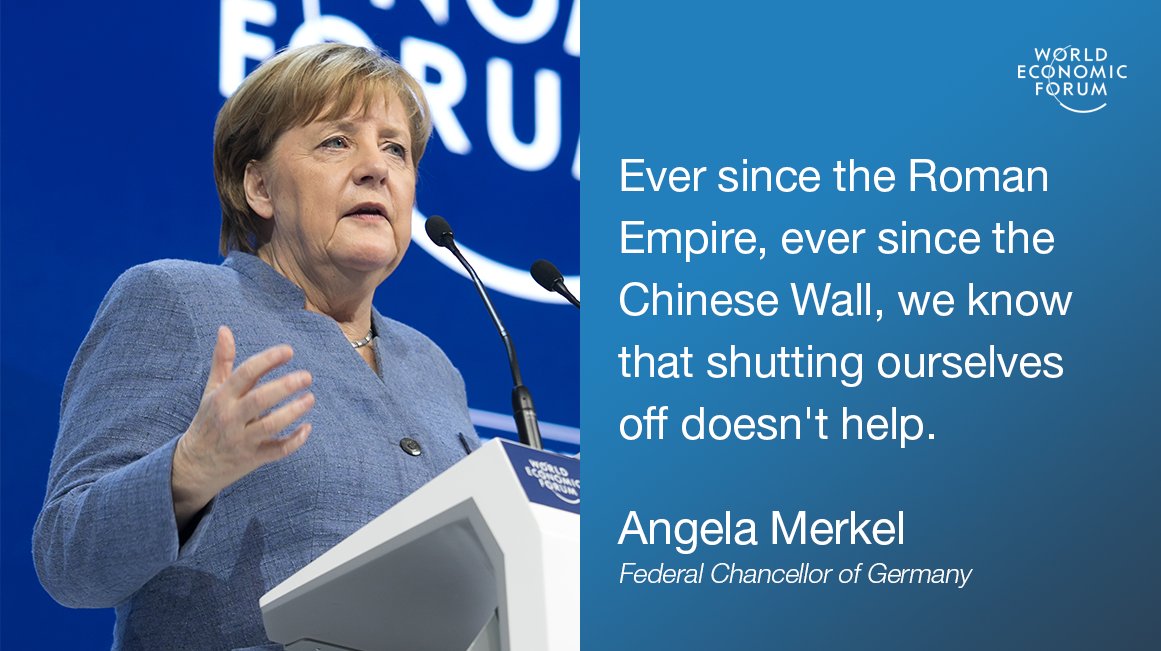Davos Digest 2018: Day Two

Gender equality, tech transformation and warnings against anti-globalisation – the themes set on day one continued to feature heavily on Wednesday’s agenda.
It was, however digital and tech that stole the show with Alibaba’s Jack Ma, Google CEO Sundar Pichai, and Microsoft CEO Satya Nadella touching on artificial intelligence, healthcare transformation, women in tech, borderless trade.
But it wasn’t just the big tech players dealing with the subject as German Chancellor Angela Merkel warned of the dangers of the digital revolution and called on Europe to figure out just how to deal with data.
From Merkel to Macron, Europe’s heads of state had plenty to say – but despite their messages of internationalism, the shadow of a certain US President looms large across the day’s events.

AI, Data – it will shape every aspect of the 21st Century
- AI – the best thing since machine-sliced bread?: Sundar Pichai, CEO of Google, stole the show from a tech perspective today with a statement on humanity’s invention of Artificial Intelligence (AI) – a creation that is “more profound than electricity or fire”. Yowsers. With a word of warning, he called for an international consensus against the weaponisation of the technology.
- Tech needs more women: In keeping with one of the summit’s underlying themes, Klaus Schwab also probed Sundar Pichai on that infamous Google employee memo. He stood behind his decision to fire the memo’s author, saying there is a moral imperative for businesses to involve more women in the development of technology products – and it starts with a positive environment.
- “When trade stops, wars start”: Alibaba CEO Jack Ma warned strongly against the use of international trade as a weapon. Ma was confident that this movement increases competitiveness amongst smaller companies and helps developing countries become the real benefactors. Ma added a little business snippet at the end – if Alibaba were a country, it would have the 21st largest economy in the world…
- Fancy retiring at 100? : If you thought mapping the human genome was impressive, just wait until we’ve have mapped the entire immune system. Microsoft CEO Satya Nadella said precision medicine will be a “game changer” for the future of humanity. As healthcare technology advances rapidly, Nadella believes that average life expectancy could reach 120 as a result of preventative medicine – “we are living in an era where magic can happen”.
- Data is the raw material of the 21st Century: Angela Merkel warned against legislative deadlock in Europe over data. She declared that data “will be the raw material of the 21st century” but there is a risk that Europe will lag behind the rest of the world if we deliberate too long on how to actually deal with data.
Looking ahead in tech: Davos will finally get to discuss the tech that’s taken 2017 by storm on Thursday – cryptocurrencies. Salesforce CEO Marc Benioff will feature in the “Rogue Technologies” talk, and Ginni Rometty, CEO of IBM, will have the chance to provide her argument on the data responsibility debate that was laid out today by Angela Merkel and Sundar Pichai.
Europe’s outlook, trumped by the President’s visit
- European recovery celebrated: Italian Prime Minister Paolo Gentiloni shared a positive vision for the European economy, claiming that the migration and debt crisis was over: “Those who have bet on a final crisis of the European Union have clearly lost.” French President Emmanuel Macron shared a similar message, saying that a strong, united Europe is needed in order to avoid global fragmentation. “France is back” he proclaimed.
- Merkel’s warning: German Chancellor Angela Merkel warned of the dangers of populism, which is “polarising state of affairs in many countries”. She echoed Modi’s warning yesterday against protectionism, and also spoke of the digital revolution and the social damage that it could cause. Merkel was not the first to address the dangers associated with the digital revolution, the WEF having used the platform to launch a new Global Centre for Cybersecurity.
- Party with the USA: US Treasury secretary Stephen Mnuchin paved the way for Trump’s address this week, announcing that the US is “open for business” – despite the party’s ‘America First’ message. Meanwhile, President Trump will be greeted on his arrival by a WEF-hosted party to “honor the President”. This hasn’t helped bury the controversy surrounding Trump’s visit, with anti-Trump demonstrators breaking through security in the early hours of the day at the Davos Congress Centre to protest the visit.
Looking ahead in politics: The highly anticipated heavyweight clash between UK Prime Minister Theresa May in the blue corner, and European Commissioner Jean-Claude Juncker in the red corner will no longer be taking place as Juncker had to cancel his visit due to the stomach flu. However Theresa May will still be speaking on Thursday, and we also have addresses from The Prime Ministers of Pakistan, Iraq, and Israel. In addition, Donald Trump is due to land in Switzerland to court European business leaders and attend his welcome party.
Business
- Against the wind: This year’s WEF has confirmed something many have known for some time – we need to do something about climate change. Indian PM Narendra Modi based part of his speech around it on Tuesday and on day two Barclays CEO Bob Dudle, said he was hugely enthusiastic about the promise of solar energy to help address the issue. In addition, Saudi Arabia are planning for a life without oil by diversifying their economic prowess. Meanwhile, US policies are seemingly blowing against the wind on this one…
- The digitisation of global trade: Globalisation and the debate over trade appears to be under scrutiny from different sides of the teams at Davos. The good news is that many leaders are looking at how digitasation can improve global trade so it functions in the interest of more people. Maersk (FH client) announced at Davos this week a new joint venture with IBM, designed to digitise aspects of the global container trade, streamlining processes for customers and their supply chain.
- Shift to the East: For some time, the West has come under increasing competition from countries like China and India. Chinese venture capitalist Kai-fu Lee reckons that China’s business approach will see it take the largest share of foreign markets in the world, more than the U.S. In addition, one of the largest Chinese e-commerce companies, JD.com, announced at Davos its plans to dual list the company in China and Hong Kong – no Western financial centre was mentioned. A sign of this shift already in motion…?
Looking ahead in business: Thursday sees discussions on the future of renewable energy, which will be a fascinating watch following Trump’s recently-imposed trade tariffs on renewables coming into the US. We also have leaders from Saudi Arabia talking about their Vision 2030 plan (FH client) to diversify the country’s economy through the likes of megacities, promotion in the private sector, and more.
Find Out More
-
Platinum CMS Award
March 13, 2024
-
Changing Communications Tack at Mobile World Congress
February 21, 2024


